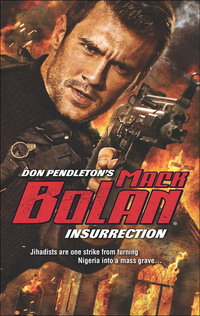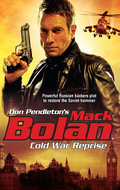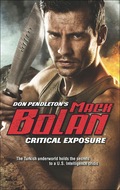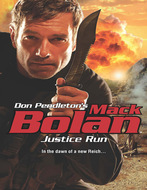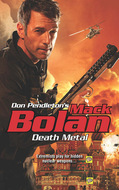Книгу нельзя скачать файлом, но можно читать в нашем приложении или онлайн на сайте.
Читать книгу: «Insurrection»
MURDER DOCTRINE
A jihadist bomb brings down a massive church in Ibadan, and injured Catholic bishops flee the sanctuary-turned-death-trap...straight into the machetes of Nigeria’s most fearsome terrorist group, Boko Haram. This bloodbath is only the beginning of a reign of terror linked to al Qaeda. As the gloating leader amps up the massacres of Christians across the country, Mack Bolan sets out to hunt him down and smash al Qaeda’s hopes of building another major African power base.
Yet the moment Bolan hits Nigerian soil, his identity is compromised. His only allies have little training, and their priority is protecting children orphaned by the terrorists’ brutal attacks. Now survival means fighting his way through the crowded city, ambush by lethal ambush, and staying one step ahead of a traitor moving in for the kill. With the death toll rising, the Executioner will have to play one last gamble to restore the region’s rightful government—and send this unholy gang of jihadists into fiery oblivion.
Bolan had to protect Paul and Jabari at all costs
Leading the terrorist a yard or so, the Executioner pulled the trigger and drilled a round through his target’s chest. The Boko Haram gunner looked shocked, as if he’d just awakened from a strange dream he didn’t understand. With his last few ounces of strength, he tried to lift his weapon.
Another round caught him in the nose, and he dropped to the floor.
The echoes of gunfire suddenly stopped. And when they did, Bolan heard distant shots coming from the direction he’d sent Paul and Jabari. The gunfire told him one thing: the battle raged on.
Pivoting on the balls of his feet, Bolan changed directions, Kel-Tac leading the way.
Insurrection
Don Pendleton

We make war that we may live in peace.
—Aristotle
Some people seem to have nothing on their agenda other than murder and mayhem. We call those people terrorists and must track down that evil and eradicate it. No quarter given.
—Mack Bolan
Table of Contents
Cover
Back Cover Text
Introduction
Title Page
Quotes
PROLOGUE
CHAPTER ONE
CHAPTER TWO
CHAPTER THREE
CHAPTER FOUR
CHAPTER FIVE
CHAPTER SIX
CHAPTER SEVEN
CHAPTER EIGHT
CHAPTER NINE
CHAPTER TEN
CHAPTER ELEVEN
EPILOGUE
Copyright
PROLOGUE
A disconcerting premonition of impending doom fell over Bishop Joshua Adewale like a cloak as his name was announced over the loudspeaker. He rose from his seat amid the applause all around him. The sinking feeling that had appeared so suddenly in his chest now dropped to his stomach. The anxiety intensified even further, making his legs feel as if they were filled with wet concrete that was one step away from setting.
Adewale walked down the aisle to the stage and mounted the steps. He stopped behind the pulpit, then turned to face the congregation.
The bishop took a deep breath as he looked out over the sea of faces that made up the Catholic Bishops Conference of Nigeria. Even now, as the gathering applauded, he realized his emotions were in conflict. He was delighted—and somewhat nostalgic—to have been invited back from New York to address the conference at this seminary where he had studied so many years ago. In the country of his birth. But at the same time, he couldn’t shake that sense of foreboding.
There had been rumors of an Islamic extremist attack planned against the conference attendees. And in Nigeria, Islamic-based terror almost always meant Boko Haram.
Adewale squeezed his fingers even tighter on the wooden podium as he cleared his throat. He knew in his heart that if he died this very second he would be on the fast train to meet Christ. Yet a small amount of the fear of death remained.
“My brothers,” he said into the microphone in front of him, “it is an honor to—”
Adewale never finished the sentence.
The bomb shook the chapel as if hurricanes were assaulting it from all four sides. Bricks flew out of the walls like missiles, several finding human targets at the same time as a section of the roof blew down and fell in a huge chunk on one section of the pews. The screaming men in those pews disappeared in a cloud of plaster and splintered wood.
Amid the shock of noise, Adewale felt helpless as debris continued to fly. The roiling smoke overtook him on the stage. It was only then that he realized he was no longer behind the pulpit. The blast had thrown him to the floor on his side. The pulpit was no longer in sight. It had been uprooted by the blast and sent sailing somewhere out over the congregation.
Through the dust Adewale could make out dozens of other bishops whose black cassocks were now dingy gray. Those who were still mobile were scrambling toward the aisles. Many of the wooden pews had been blown from the bolts fastening them to the floor, and jagged pieces of wood and steel acted as shrapnel, slicing through flesh in the panic.
For a moment Adewale lay frozen in surprise. Then pain seared through his left forearm and he looked down to see that something had cut deeply into him just below his elbow. But the dust was so thick, he couldn’t identify the object.
His eyes burning, Adewale clamped his right hand over the wound in his left arm, and the bleeding slowed slightly.
Through openings in the thick dust clouds the bishop could see human remains—a few bodies, others blown to pieces. The few who had been spared serious injury helped others down the aisles.
Still stunned from the blast, as well as the horror before him, Adewale realize what was in his forearm: a small metal hinge—undoubtedly from the pulpit.
The bishop rose to his knees. “No! Don’t leave!” he yelled. Under the current conditions they were safest right where they were, inside the ruins of the building.
He knew what awaited any bishops who made it outside.
Adewale tried to shout again, but when he drew in a breath he was choked by the dust. He fell back to his hands and knees, as the panicked clergymen surged forward.
Someone at the front of the stampede of men finally got the door open and the bishops who had survived the explosion began fleeing into the sunlight. Adewale reached the door just in time to see Boko Haram terrorists surround the clergymen, their razor-sharp machetes gleaming in the sunlight.
Then what was left of the chapel roof behind him collapsed, and something struck the back of his head.
As his eyelids fluttered shut, Bishop Joshua Adewale knew he would be spared.
There was something he still had to do.
* * *
SIX BLOCKS FROM the main chapel of Saints Peter and Paul Seminary, Fazel Hayat sat cross-legged on top of the tin roof of a mud-and-plaster house. A pair of Steiner 10x50 power binoculars were pressed to his forehead. They had provided a close-up view of the explosion in the chapel, and now did the same for the machete slaughter.
Hayat couldn’t help but smile. Dhul Agbede’s improvised explosive device had worked perfectly. But then the man’s weaponry always did. Hayat’s right-hand man, and Boko Haram’s top assault expert, knew more about weapons than anyone else in their network.
Hayat glanced to his side, where his second-in-command now sat quietly. For a moment, he wondered just how much Dhul’s given names might have influenced his interests and studies as he’d grown up. Dhul Fiqar meant “name of the Prophet’s sword” in the Yoruba tongue, and the man’s last name, Agbede, translated roughly as “blacksmith.” Dhul was a blacksmith by trade, and in addition to the elaborate gold-inlaid and ivory-handled machetes both he and Hayat wore in the sashes around their waists, he had forged the more rustic, yet equally deadly blades the Boko men in the distance now used to eliminate the Catholic bishops who had survived the bomb inside the chapel.
Hayat kept the binoculars close to his face, but watched Dhul in his peripheral vision.
The man’s eyes betrayed no emotion of any kind. The fact was, they were a dull black, and reminded Hayat of a shark. The Boko Haram leader shook his head. He had seen Dhul construct bombs and then put them in place with a completely deadpan expression on his face. He had seen him kill innumerable Christians and Jews with his gold-inlaid, nickel-finished machete. Deadpan again.
Hayat wondered if the fact that the man never showed any outward emotion might be because he felt no emotions. If that was the case, it meant he was truly a psychopath.
The Boko Haram leader shrugged and turned his attention back to the slaughter going on at the seminary. It mattered little if Dhul was a sociopath. If so, he was certainly a useful one.
Hayat watched as two of the remaining bishops attempted to get away. A pair of his Bokos went to work, hacking them down. A heavyset clergyman had picked up a loose wooden plank with nails extending from one end. Grasping it with both hands, he swung it at one of his assailants. The Boko parried the spiked weapon of opportunity, then swung his machete in a reverse stroke. The overweight bishop fell to his knees, gripping his slashed neck. Fazel Hayat watched as his head threatened to separate from the rest of his body. But with his left hand clutching his throat and the fingers of his right encircling the large crucifix suspended around his neck, the heavy man hit the ground dead, but still in one piece.
The Boko who had killed him went back to the bishop he had been working on.
The discrepancy brought a shrug to Hayat’s shoulders. Men—even trained men such as his Boko Haram army—often reacted strangely in battle.
A second later, the entire building came crashing down behind the pile of dead bodies. The blood-splattered Boko Haram fighters stepped back when stone and scraps of wood flew through the air as if a second explosion had taken place. Dust rose as if a million hookahs were blasting their smoke toward the sky. Then the Bokos made their way through the killing field, clutching their blood-drenched machetes as they searched for any remaining life. Each time one of the men on the ground twitched— either as a last sign of life or in an involuntary muscle spasm after death—one or more machetes slashed downward, putting an end to the movement.
In all but one of them.
Suddenly rising from a pile of bodies, a bishop wearing a cassock more gray with dust than black climbed to his feet and began stumbling away. It was the bishop from America, Joshua Adewale. He walked directly past several of Hayat’s men, who appeared not to notice his presence.
A cold chill twisted down Hayat’s nape and along his spine to his lower back. What he was seeing was impossible. It was unnatural. It could not have been happening. He had personally witnessed a huge concrete block strike this man in the back of the head. It should not only have rendered him unconscious, it should have killed him.
He turned toward his second-in-command. “Dhul,” he said quietly, “did you see that?”
“Did I see what?”
“That bishop. The one who just stood up and walked away.”
“I saw it,” Agbede said. “He was lucky. But do not worry. We will get him soon, somewhere else.”
“Then it was not my imagination?”
“Not unless it was my imagination, too.”
“It was the American, Adewale,” Hayat said. “The one who was scheduled to speak first.” He let his binoculars fall for a moment, resting his eyes. “He was holding his arm. It appeared he was injured.”
“He was lucky,” Agbede repeated.
Hayat watched the gray-black, ghostlike figure as it stumbled on, growing smaller and smaller, walking away from the chapel. The phrase “It was more than luck” fluttered through his brain, but the thought was disturbing, and he repressed it.
CHAPTER ONE
The Learjet bore no military, police, national or corporate emblems, only the bare minimum of markings required by international law. It had flown directly from the United States to Argentina, where the big man, who was Jack Grimaldi’s only passenger, had provided officials with documentation that he was an executive for Gulf Oil.
The trip from the US to South America had been nothing but show. It was a simple ruse on the million-to-one chance that any of the world’s antagonists had stumbled across the Learjet’s real destination.
After refueling, Grimaldi, the number-one pilot at Stony Man Farm, had charted a new route, from South America across the Atlantic Ocean and then the Gulf of Guinea, allowing them to enter Nigerian airspace from the south without tripping the radar of any other country.
During the flight, the big man had changed from the perfectly tailored suit he had worn in the guise of an oil mogul into faded blue jeans, well-worn and scuffed hiking boots, and a gray T-shirt beneath a khaki photographer’s vest. Now he was a freelance photojournalist.
But beneath this outer shell was the man’s true identity. He was not a photographer.
Mack Bolan, aka the Executioner, was a warrior.
Hidden beneath his long, multipocketed vest, on the left side, was a Concealex nylon shoulder holster that had been specially designed to carry his Beretta 93-R machine pistol. The weapon was equipped with a custom-made sound suppressor threaded onto the barrel.
On his right side, connected to the other end of the shoulder rig, was a double magazine carrier. Its rigid form held the twin mags securely, without the need for retaining straps or other devices that would slow down a reload. Also on Bolan’s right side, secured on the thick leather belt threaded through the loops on his jeans, was a holster that toted his mammoth .44 Magnum Desert Eagle.
At the small of Bolan’s back was a Cold Steel Espada knife, which bore a notch in the top of the blade that enabled it to be drawn, hooked on a pocket or belt, and snapped open in one fluid motion.
Last but not least was a tiny North American Arms .22 Magnum PUG mini-revolver. The small but mighty weapon had saved Bolan’s life on more than one occasion as a last-ditch, hidden “hold out” weapon.
The landing gear of the Learjet descended and locked into place. Ahead and below, Bolan saw the runway. He knew that much of the clothing and other gear he had brought along would not be needed. But the cameras and other photographic equipment backed up his cover story. And in regard to his combat accessories, the soldier’s philosophy had always been that it was better to have it and not need it than to need it and not have it.
The largest of several screens set into the control panel in front of the two men blinked twice. Then the head, shoulders and chest of a man wearing a gray suit and burgundy necktie appeared. “Good evening, Striker,” the man said.
“Evening, Hal?” Bolan queried. “Does that mean it’s evening where you are or where Jack and I are getting ready to land?”
Hal Brognola, the man on the screen, pulled a ragged-looking cigar from the breast pocket of his jacket and shoved it into a corner his mouth. “Sounds like you just woke up,” he said around the cigar stub.
“I caught a few winks after we left Argentina,” Bolan answered.
“It’ll be early evening by the time you touch down in Ibadan. You may want to reset your watch. How much sleep did you get?” Brognola looked slightly concerned.
“Enough. I slept all the way from the US to Argentina. Then caught another nap after we took off again. I’m good to go.” He studied the man on the screen. Hal Brognola was a high-ranking official at the United States Department of Justice. But he was also the director of Sensitive Operations at Stony Man Farm, the top secret counterterrorist command center with which Bolan often worked.
“So tell me what I’m getting into, Hal,” he said.
“I could tell you, but I think it’ll mean more if I show you.”
The screen went blank for a few moments. Then a grainy video, probably shot by a cell phone, began to run. In the short clip Bolan saw the ruins of what looked to have once been a church building. Bodies were strewn among the rubble of what might have been a chapel. Partially burned books—Bibles and hymnals, perhaps—were scattered here and there. Chunks of scorched wood that resembled the corners of pews and the top half of a broken crucifix lay among smoldering embers.
But the setting took a backseat to what was happening in front of the decimated church. Men dressed in the odd combination of civilian and military clothing so often found in warring, developing countries, were swinging their machetes at other men wearing the long cassocks of Catholic clergy. The weaponless men in the long garments all looked as if they’d been inside when the explosion had detonated; they were covered head to foot with ash.
The Executioner felt his eyebrows lower and his jaws tighten as he watched the barbaric mass murder. The clip ended with one of the bishops being slashed across the throat and falling forward to the ground. Bolan concentrated. Something had caught his attention, but he wasn’t sure exactly what.
Brognola’s face returned to the screen. “Ugly stuff, Striker.”
“Some of the worst I’ve seen. Where’d you get it?”
“A CIA snitch happened to be close to the action and recorded it,” Brognola replied. “We hacked into the Company and made a copy.”
Bolan paused, letting the righteous anger filling his chest recede slightly. Out-of-control anger would not serve him. If a warrior let rage take over, he ended up like the men bleeding out on the ground in the clip. And no one was helped.
“That was a meeting to kick off the Catholic Bishops Conference of Nigeria,” Brognola said. “In Ibadan. Opening day.”
“Aside from the fact that no one deserves that type of treatment,” Bolan said, “how do we fit into this picture?”
“One of the men in attendance was a Nigerian-born but naturalized US citizen. Bishop Joshua Adewale, from New York.”
“I take it the bad guys are Boko Haram?”
“Have to be,” Brognola replied. “It’s Nigeria, after all. What’s a little unusual, though, is that the Bokos have operated primarily in the northern part of the country up until now. Kano, Maiduguri and the surrounding regions. But I guess the Catholic bishops conference in the south was more than they could resist. Made it worth the trip.”
Bolan’s ears popped and he realized that Grimaldi was still bringing the Learjet down through the sky. Glancing at the pilot, he said, “How much longer, Jack?”
“About five more minutes.”
Turning his attention back to the screen, Bolan said, “The Bokos have ties to al Qaeda, don’t they, Hal?”
“We’re 99 percent sure of it. There’s a rumor about some ‘super assassin’ from al Qaeda who’s running with the Nigerian terrorists.” Brognola pulled the cigar from his mouth for a second. “Informants don’t know who, though.”
Bolan squinted slightly at the screen. “I saw something on that clip,” he mused. “I’m not sure exactly what, but it got caught on the radar between my ears. Can you run that video again?”
“Sure thing, big guy.” A moment later the grainy film was on the screen again and the machete massacre was repeated. The Executioner continued to frown, concentrating more on the top, bottom and sides of the screen than the main action on which the photographer had focused. As the clip neared its end, he saw what only his subconscious had caught the first time.
Just before the final bishop’s throat was slashed, to his side and almost out of the frame, two men with machetes were attacking other victims. One chopped at an arm. The other went for the neck. But what seemed weirdly out of place was that another bishop walked unsteadily right between them. Both men with machetes turned and saw him, but ignored him.
“Take it back a little, Hal,” Bolan said. “Then pause it.”
The clip ran in reverse, with machetes leaving the cuts they’d made on the bishops and returning to the raised hands of the attackers. Blood flew back through the air, reentered the bodies of the men in the black cassocks, and the bishops who had fallen stood up.
“Stop it right there,” the Executioner said, and the clip froze on the screen. “Did you see what I just saw?” he asked Brognola.
“I didn’t until just now,” the director of Stony Man Farm admitted. “There’s barely enough room between those two Bokos for the man to squeeze through. And they both obviously saw him—they turned their heads and looked directly at him. I’ll have our computer team run a facial recognition comparison, to make sure, but I recognize the man who walked out of the picture. That’s our American. Bishop Joshua Adewale.”
“Any idea where Adewale went?” Bolan asked.
“No. Like I said, I hadn’t even noticed him until you pointed him out. But I—”
Bolan heard a phone ring in the background and Brognola said, “Hang on. That’s Aaron. He’s got a copy of this footage and he may have found something.”
Bolan waited. By now he could see the runway below. Aaron “the Bear” Kurtzman was Stony Man Farm’s resident computer genius and one of the most knowledgeable computer experts in the world. He viewed what he sometimes called his “magic machines” with an eye for both science and art, and was an invaluable asset to the Farm.
As the plane’s tires hit the tarmac, Brognola came back online. The frozen image of Joshua Adewale walking between the two Boko Haram terrorists was still on the screen, but Brognola’s voice could be heard behind it. “I’m putting you on speakerphone, Aaron,” he said. “Tell our man in Nigeria what you just told me.”
A second later Kurtzman’s familiar voice said, “Hello, Striker.”
“Hello, Bear. What have you got for me?”
“Not much, I’m afraid. I’m staying tapped into the CIA because it was their snitch who shot the clip. I noticed the bishop walking between the two machete-wielders myself.”
“Great minds working independently,” Brognola said with a trace of humor.
“Yes, whatever,” Kurtzman replied. “In any case, the same informant tried to follow Adewale. They walked away from the university chapel and into a low-rent housing area, where the snitch lost him.”
“But we know he’s alive someplace?” Bolan asked.
“Well,” Kurtzman replied. “We know he was alive. At least for a while after the bombing and machete attack. But we’ve got no idea where he might be now.”
“Thanks, Bear,” Bolan said. He turned his attention to Brognola. “Okay, Hal. My guess is you’d like me to find Adewale, as well as track down the terrorists responsible for this and eliminate them?” Before the big Fed could answer, he went on. “I’m assuming the rest of the conference has been canceled?”
“There aren’t enough bishops left to continue it,” Brognola replied. “There were two who arrived late and were still at the airport when the explosion occurred. The Vatican ordered them to get out of the country immediately. The Nigerian officials recommended they do the same. So they’re on their way to Rome. The church is going to have to reorganize its entire structure in Nigeria, and that’s going to be a monumental job.”
“Sounds like my mission’s clear,” the Executioner said. “Rescue Joshua Adewale. But with no more to go on in locating him, I’ll plan on going after Boko Haram. I’ve got a feeling the bishop will pop up somewhere along the way.”
“How you operate is your call,” Brognola agreed. “As always.”
“How do I stand on entering the country, Hal?” he asked.
Brognola knew exactly what he meant. “I pulled a few strings through a CIA friend of mine. You’ll be met by a customs agent named Sean Azizi. He’ll walk you through customs and immigration and stamp your passport himself. No search of your bags or person.”
“Sounds a little too good to be true.”
“My friend just happened to have an informant in the right place at the right time,” Brognola said. “You know how that goes. A guy who knew a guy who knew a guy, the last guy being Azizi. Anyway, unless Azizi or one of the other guys can’t keep from flapping their gums—and they’re all getting paid big bucks to keep it a secret—no one else in Nigeria should be aware that Matt Cooper is anything other than the photojournalist he says he is. And even Azizi won’t know who you really are or why you’re there.”
Bolan cleared his throat. “It won’t matter,” he said. “Everyone in Nigeria will know about the chapel bomb and the machete attack. If my cover ID gets burned, it won’t take a genius to guess why I’m there.”
“True,” Brognola said. “Their first thought’ll be that you’re CIA.”
“It always is. Okay. I’ll play it by ear, Hal. Who’s my initial contact?”
“A woman named Layla Galab,” Brognola said. “You’ll find her at the Isaac Center. Any cabdriver should be able to take you there.”
“Affirmative.”
“Good luck, big guy.”
Bolan paused before answering. He and Brognola both knew that luck rarely entered the picture. For the most part, a warrior made his own luck. So finally, he said, “Thanks,” as the Learjet’s wheels quit rolling on the tarmac of Ibadan Airport in the state of Oyo, Nigeria.
* * *
BISHOP JOSHUA ADEWALE’S unconsciousness couldn’t have lasted more than a few seconds, he realized, as he opened his eyes again. He could still hear the screams and shrieks he had heard right before being knocked out by whatever had hit him in the back of the head. And as he rose to a sitting position on top of the bodies of several other bishops who had been cut down by the machetes, he saw the massacre still going on outside the chapel.
The pain in the back of his head was bad but tolerable as he stood. A strange feeling of remoteness seemed to come over him. He could see the angry, cursing men with the wicked blades, cutting and slashing and severing heads and limbs from the bodies of men who were dressed similarly to him. The sight made him sick to his stomach. But he knew, somehow, that he was invulnerable to their attack.
Adewale began to walk forward. He had no idea where he was going and only the vaguest memory of where he was and even who he was. His body ached from the top of his head to the soles of his feet, as if someone had punched him repeatedly in the face, then the sides of his head, then his chest and every other square inch of his body. Each step he took brought on new pain. It hurt to walk, but when he stopped briefly between two of the blood-crazed attackers, he realized it hurt just as much to stand still. Turning a full 360 degrees in an attempt to get his bearings and remember where and who he was, he saw the remnants of what looked to have once been a chapel.
Only one wall still stood, and the bishop did his best to focus his fuzzy eyes on a stained-glass window that had miraculously been spared. Spared from what? he wondered for a moment. Then he recalled a loud noise. As his vision began to clear, he continued to look at the stained glass. It featured Jesus Christ on the cross, his forehead bleeding from the crown of thorns that had been placed on his brow. The sight brought back another piece of Adewale’s past, and he remembered that he was a priest—no, a bishop.
He turned away from the ruins and saw the men on both sides of him. One swung his machete at Adewale’s neck. Miraculously, the assault fell short, but the ugly black steel came close enough that he felt the air move against his throat.
The compulsion to walk came over him again, and he moved on, passing between the two attackers and wondering why he had no desire to run. But the same remoteness, a feeling that even though he was in the presence of evil, he was invulnerable to the blades, continued to coax him on.
Still wondering why he felt no fear, the bishop left the screams and cries behind him and walked on. He did his best to take stock of the situation, focusing his brain on what he could remember as he continued to walk down an asphalt street.
He was a bishop; he remembered that now. A bishop in New York City. But he was not in New York at the moment. Was he back in his home country of Nigeria? He thought so.
Adewale pushed himself on, one wobbling step after another. Something had happened in the chapel, where he’d been speaking to a group of fellow bishops. A bomb? Yes. A bomb set by terrorists. Thugs who were now chopping the survivors to pieces with their machetes. He had been spared. Why, he didn’t know, but he knew that they might still find him and kill him.
The bishop realized he had entered a low-income housing area. Every block he passed exhibited a little more poverty than the last. Soon the rough asphalt ran out and was replaced with dirt streets.
Finally, the bishop came to a corner and halted abruptly. Why he’d stopped was as big a mystery as why he’d felt compelled to walk. He found himself next to a wood-frame house, and his eyes were drawn to the backyard, where a clothesline had been stretched from the building to a rough wooden pole in the ground. Most of the clothes hanging on the line looked like women’s, but right in the center, waving gently in the breeze, were a pair of khaki pants and a matching work shirt.
The bishop glanced down at his cassock. It had been black, but was now covered in so much dust it was gray. It would still identify him as a Christian bishop if the terrorists who had bombed the chapel came looking for him.
Adewale knew he needed to change clothes. He would take the pants and a shirt from the line. He started that way, then halted again.
Thou shalt not steal ran through the bishop’s mind. Taking these pants and the shirt would be wrong. He didn’t want to steal. He particularly didn’t want to steal from anyone so poor they had to live in this crumbling shack.
Бесплатный фрагмент закончился.
Начислим
+10
Покупайте книги и получайте бонусы в Литрес, Читай-городе и Буквоеде.
Участвовать в бонусной программе
